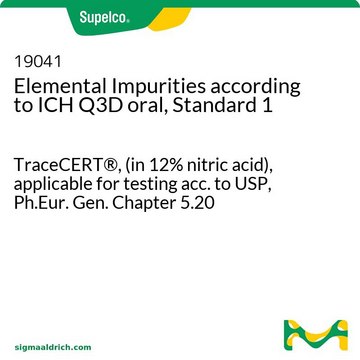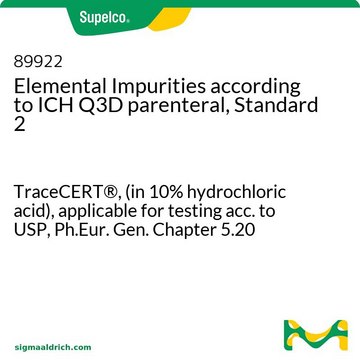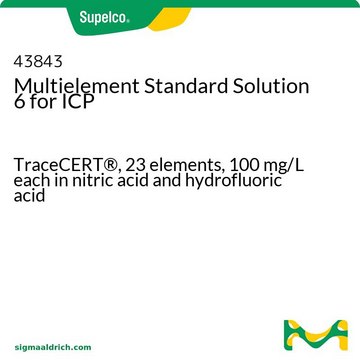69729
Elemental Impurities according to ICH Q3D oral, Standard 3
TraceCERT®, in nitric acid and hydrofluoric acid (5% nitric acid and <0.5% hydrofluoric acid ), applicable for testing acc. to USP<232>, Ph.Eur. Gen. Chapter 5.20
Synonym(s):
ICH Q3D oral elemental impurities
About This Item
Recommended Products
grade
certified reference material
TraceCERT®
Quality Level
Agency
according to ICH Q3D
according to Ph. Eur.
according to USP
product line
TraceCERT®
shelf life
limited shelf life, expiry date on the label
composition
Ba, 140 mg/L
Cr, 1100 mg/L
Cu, 300 mg/L
Li, 55 mg/L
Mo, 300 mg/L
Sb, 120 mg/L
Sn, 600 mg/L
concentration
in nitric acid and hydrofluoric acid (5% nitric acid and <0.5% hydrofluoric acid )
technique(s)
ICP: suitable
format
multi-component solution
General description
Certified content incl. uncertainty and expiry date are given on the certificate.
Download your certificate at: http://www.sigma-aldrich.com.
Application
- ICH Q3D elemental impurities testing guidelines: A study conducted rapid screening of pharmaceutical products for elemental impurities using a high-resolution portable energy dispersive X-ray fluorescence spectrometer. This method adheres to ICH Q3D guidelines for oral dosage forms, offering an efficient tool for routine quality control in pharmaceutical manufacturing (Zhu et al., 2023).
- Elemental impurity analysis for pharmaceuticals: Research focused on the human health risk assessment of total chromium impurities in cough syrups. This study aligns with ICH Q3D regulations, emphasizing the need for rigorous testing of oral pharmaceuticals to ensure consumer safety, particularly regarding the toxic potential of elemental impurities (Jurowski and Krosniak, 2024).
- Pharmaceutical trace metal contamination standards: The determination of ICH-Q3D elemental impurity leachables in glass vials was explored using Inductively Coupled Plasma Mass Spectrometry (ICP-MS). This research underscores the importance of assessing leachable heavy metals in drug packaging to prevent contamination of oral drug products (Breckenridge et al., 2023).
Preparation Note
Legal Information
Not finding the right product?
Try our Product Selector Tool.
related product
Signal Word
Danger
Hazard Statements
Precautionary Statements
Hazard Classifications
Acute Tox. 4 Dermal - Acute Tox. 4 Oral - Eye Dam. 1 - Met. Corr. 1 - Skin Corr. 1B
Supplementary Hazards
Storage Class Code
8B - Non-combustible corrosive hazardous materials
WGK
WGK 1
Flash Point(F)
Not applicable
Flash Point(C)
Not applicable
Choose from one of the most recent versions:
Already Own This Product?
Find documentation for the products that you have recently purchased in the Document Library.
Customers Also Viewed
Articles
Elemental impurities in drug products pose a risk to patient health due to toxicological effects, and their levels should be controlled within acceptable limits. Find analytical methods and materials for impurity assessment.
In 2009, the International Conference on Harmonization (ICH) proposed the development of a new harmonized guideline to provide a global policy for limiting metal impurities in drug products and ingredients. This approach provides clear regulatory guidance on specification limits for elemental impurities worldwide and logically should have an impact on the work of the national regulatory bodies in having transparent and comparable results.
Our team of scientists has experience in all areas of research including Life Science, Material Science, Chemical Synthesis, Chromatography, Analytical and many others.
Contact Technical Service

![Benzo[a]pyrene certified reference material, TraceCERT®, Manufactured by: Sigma-Aldrich Production GmbH, Switzerland](/deepweb/assets/sigmaaldrich/product/structures/253/820/be96d879-1811-46c0-8f11-612019691c2d/640/be96d879-1811-46c0-8f11-612019691c2d.png)








